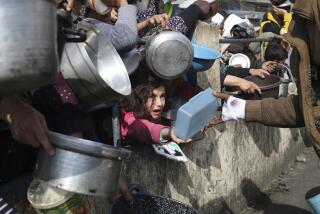Arafat’s Inner Circle Makes Do in His Absence
JERUSALEM — Flanking a chair left empty by the emergency medical evacuation of Yasser Arafat, Palestinian officials convened a leadership meeting Saturday in an attempt to allay fears of a power vacuum caused by the Palestinian Authority president’s absence.
It was the first time in 35 years that Arafat had not presided over a meeting of the executive committee of the Palestine Liberation Organization, which serves as the senior decision-making body for Palestinians.
These facts alone emphasized the void left by Arafat, whose incapacitation foretells an upheaval in Palestinian politics and vast uncertainty for neighboring Israelis. A Jordanian military helicopter Friday evacuated the 75-year-old rais, or president, from his battered compound in the West Bank city of Ramallah and rushed him to a hospital near Paris.
At the Percy Army Teaching Hospital on Saturday, Arafat underwent a second day of numerous medical tests, including a scan for leukemia, one of several cancers or other maladies that his symptoms suggest.
Leila Shahid, the top Palestinian official in France, said that doctors had not determined what was ailing Arafat, but that the test results thus far did not show him to have leukemia.
“The doctors excluded for the time being any possibility of leukemia,” she said in a brief statement to reporters in front of the hospital gates. “There are many other possibilities.”
Doctors say it takes several days to produce the results of a bone marrow biopsy that can rule out leukemia.
When Arafat departed Ramallah, leaving the West Bank for the first time in more than two years, he was suffering from an intestinal flu and a low level of platelets, which help blood clot.
He was disoriented, extraordinarily weak, unable to recognize lifelong colleagues and had at one point lost consciousness, people who were with him said. Doctors said the low platelet count could indicate cancer or another life-threatening illness.
Shahid said French doctors would make a public statement on the Palestinian leader’s health when tests and scans were completed in coming days.
“We have nothing to hide,” she said, adding that Arafat had “a very good night’s sleep and woke up in a good mood” asking to speak to his daughter, Zahwa, who is in Tunisia. “He’s physically and psychologically better.”
In the West Bank, meanwhile, Palestinian officials were keen to broadcast an image of “business as usual” and show that Palestinian institutions, as weak as they are, continue to function. The Palestinian Legislative Council, the leadership of Arafat’s Fatah faction and a national security council that oversees all Palestinian police forces will convene today, and senior Palestinian officials planned to brief international diplomats Monday.
“President Arafat wants us to continue normally, particularly in these difficult circumstances,” Mahmoud Abbas, Arafat’s No. 2 on the PLO executive committee, said after Saturday’s meeting.
Abbas has taken over running the PLO, and Palestinian Authority Prime Minister Ahmed Korei, known as Abu Alaa, has taken over day-to-day management of the Palestinian Authority, both at Arafat’s request, officials said. Although the Palestinian Authority is the internationally recognized governing agency for the Palestinian territories, the PLO eclipses it in real power.
Abbas, better known as Abu Mazen, urged the Palestinian public and myriad factions “to unite and work together so that there will be no pretext that may be used to harm the Palestinian people.”
He read from a prepared statement and would not take questions.
At the meeting, held in the same sandbagged headquarters that Arafat had left the day before, Abbas and others symbolically left the chair at the head of the table -- Arafat’s chair -- empty. Abbas, as secretary-general of the committee, presided.
Palestinian officials are reluctant to make overt plays for power while Arafat is alive and are taking pains to appear respectful and act as though they expect their leader to return.
The inevitable post-Arafat period is, for many people on both sides of the Middle East conflict, too scary and unpredictable to ponder. A period of violence and political chaos within the Palestinian territories seems likely.
Arafat has never groomed a successor. More importantly, he never allowed democratic institutions within the Palestinian entity to mature. Even before the current intifada erupted four years ago, when numerous government institutions and other democratic trappings were functioning relatively well, Arafat continued to micromanage and insisted on approving even minor decisions.
By law, if Arafat were to die, the speaker of the Palestinian parliament would formally take over until elections could be held. They would be the first elections without Arafat as a candidate, and the results would be unpredictable. Marwan Barghouti, the most popular politician after Arafat, is serving multiple life sentences in an Israeli prison.
Abbas seems most likely to immediately succeed Arafat -- whether through election or de facto ascension. He is the most senior, well-known and respected figure among Palestinians after Arafat, and a political moderate. He has been at Arafat’s side through decades of the Palestinian struggle for statehood.
But Abbas does not have a wide base of support. Arafat named him as the Palestinian Authority’s first prime minister last year but refused to grant him real authority. Abbas quit after four months.
The Palestinian officials’ efforts to calm the public and wave off radical pretenders did not settle fears about Arafat’s health and the future.
“He is very, very sick,” said Antoine Sfeir, a Middle East analyst. “I’m not sure he’ll make it back to Ramallah. I don’t think his health will allow him to leave the hospital and if he is released, the Israelis will not allow his return.”
Outside the hospital near Paris, about 30 Arafat supporters held vigil. They chanted slogans, waved Palestinian flags and deposited flowers. One person delivered a huge basket of chocolates at the gate.
“We are out here to support President Arafat,” said Yasser Balawi, who grew up in the West Bank city of Nablus but moved to France, where he works as an electronic engineer. “We want to show him we are with him through this difficult period.”
Not everyone was welcoming. Jewish families of victims killed in Palestinian attacks in Israel have asked French anti-terrorism Judge Jean-Louis Bruguiere to order judicial authorities to interrogate Arafat in the hospital.
*
Wilkinson reported from Jerusalem and Fleishman from Paris. Special correspondent Maher Abukhater in Ramallah contributed to this report.
More to Read
Sign up for Essential California
The most important California stories and recommendations in your inbox every morning.
You may occasionally receive promotional content from the Los Angeles Times.












